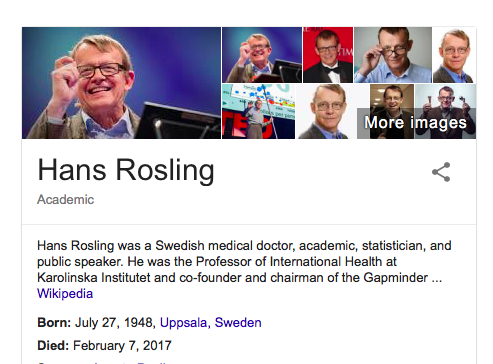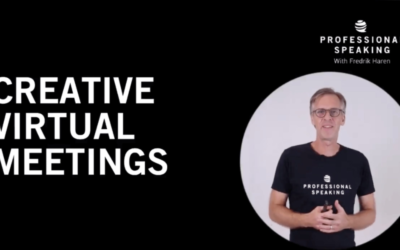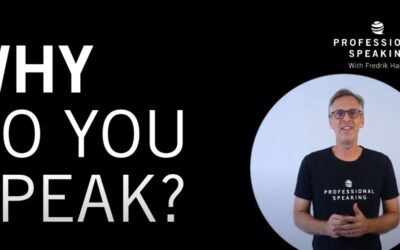
I write this as I just found out that Hans Rosling has died. The news hit me like a punch in the stomach.
I have shared the stage with many great speakers, but for many reasons Hans Rosling is probably the one speaker I respect the most. Seeing him present in his very unique and personal style thought me so much about speaking. His approach to life, work and his mission to help people better understand the world thought me a lot about being a human.
In this post I want to honour this great man and great speaker by writing down some of the ways I respected him – and learnt from him – as a speaker. I wish more people working on other important issues would study and learn from Dr Rosling when it comes to the skill of getting a message across.
Because get his message a cross he did. His TED-talk has more than 11 000 000 views (!) and is one of the most watched TED-talks ever. He spoke so that world leaders and the common man on the street all listened.
Here are some things we can all learn from how he spoke:
1) He was on a mission.
Watching Hans Rosliing speak you can tell that he was passionate about he was speaking about and that he was on a mission to educate the world about the issues he cared about.
Passion + Mission is a very potent combination and the audience can always feel which speaker is passionate about his or her topic and which are not.
If you are not passionately on a mission around the theme you are speaking on, then stop speaking or start speaking on a topic that is in line with your mission.
2) He was genuine.
With his Swenglish English and his big stick that he carried around you could tell that Hans Rosling could not care less about what other people thought about him as a presenter. For him it was not about him: it was about people listening to what he wanted them to understand
He did not go up on stage trying to be someone else or to try to play the “guru” or the “keynote speaker”. He went up and was his genuine and authentic self – and the audience rewarded him with their love.
The audience will always prefer a speaker who is who he – or she – is over a person trying to be someone else.
3) He did not try to impress anyone – he just wanted to make an impression.
At the end of his life Hans Rosling was as close to a rockstar as a professor can be, at least in Sweden. But Hans never let the fame get to him. He was humble, curious and always willing to learn. He understood that to get a message across you can not focus on yourself – you have to focus on the message. And he also understood the power of presentation skills in order to make a message stand out and get across.
4) He had fun.
Watch any of his speeches and you can tell that he enjoys the stage, enjoys the art of speaking – and of getting people to learn.
Many people hate the act of speaking, and if you hate something you will not enjoy it. But the reverse might also be true: if you enjoy what you do you will start to like it.
Whenever you are asked to speak, try to look at it as something positive – as an opportunity to get your message across and then try to have as much fun as you can while doing it. I can almost promise you that that approach to speaking will make you a better speaker.
5) He liked to teach.
In many ways Dr Rosling was the perfect example of the “professor we all wished we had in University”. The teacher who still loved to teach.
And all speakers are teachers – we have a message we want to get a cross and we are teaching our audiences this message.
The question we have to ask ourselves as speakers is: are we teaching it in a style that will make people think about our session as one of their favourite sessions?
6) He was funny.
Ha made fun of world leaders and his students and many others in his speeches but always in a way where you always felt that he would – in an instant – also make fun of himself
Humour – and especially self deprecating humour – is one of the strongest weapons a speaker has in the speaker toolbox.
He was also an extreme optimist with a very positive outlook on life and the world – and this attitude was contagious. People are much more open to a message when it is presented in a hopeful and positive way.
7) He did not take himself so seriously – but took the things he spoke about very seriously.
Hans Rosling showed that you can talk about something very serious or complex (world health statistics) and still do it in a engaging and inspiring way. That is a very powerful message there that I wish more speakers would spend more time understanding.
Hans Rosling might be dead, and the world is sadly a more ignorant place. But his hopeful message will continue to spread. And hopefully many speakers will be inspired by him to improve the way they communicate their own messages to the world. I know he inspired me.
Heaven is now a more positive and less ignorant place.
ps. Hans Rosling died at the age of 68. The life expectancy of the world population today is 70. He wanted you to know that.




